Congratulations to the five co-winners of the 2021 Lasker Essay Contest!
“2020 was a year like no other” is a phrase we have all heard—many times. But what do we really mean by that? And what are we going to do about it? We asked graduate students, post-doctoral researchers, public health students, medical students, and residents to tell us the most important lesson they learned from the Covid-19 pandemic and how that lesson will influence their future careers. The responses from hundreds of trainees on 5 continents and 21 countries were remarkable in their universality. Every trainee was personally and profoundly affected by the pandemic.
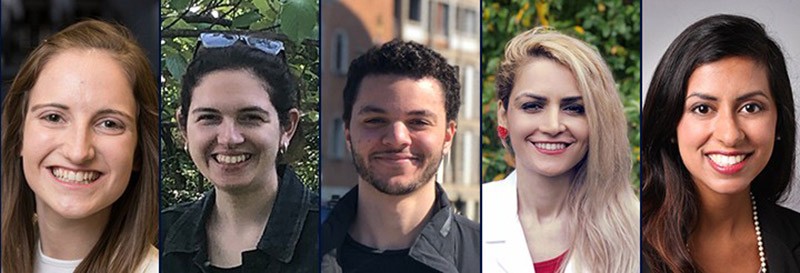
Adina Schonbrun, Miriam Saffern, Ziad Ali, Banafsheh Nazari, and Trisha Pasricha
We were inspired by the resilience shown in many of the stories—quickly pivoting research goals and protocols to fit new social restrictions, adapting to split-shift schedules and loss of childcare—and by the depth of human kindness: starting peer mentor groups, converting basements into home-made mask factories, or listening more carefully to marginalized patients. From hundreds of entries illustrating the ways in which Covid-19 changed a generation of medical researchers and health care professionals, a few central themes emerged, exemplified by the essays of the five winners: Miriam Saffern, who wrote about the importance of clear science communication to lay audiences; Adina Schonbrun, who realized what it truly means for science, research, and clinical care to be team sports; Banafsheh Nazari, who wrote about the need to embrace new technology in medicine; Ziad Ali, who found what it means to be courageous as a scientist in the face of uncertainty; and Trisha Pasricha, who shared a gut-wrenching story about the injustice of health inequity.
A Reluctant Communicator
In her essay “My Mother is a Layperson”, Miriam Saffern writes that during the pandemic, “I began to realize that perhaps my reluctance to discuss my research [with my family] was because I did not know how to convert a scientific idea into a simple explanation.”
Yet she was the one her family turned to when they needed answers about SARS-CoV-2, the virus that causes Covid-19. Miriam took this responsibility to heart and kept her family informed with easy-to-understand text message summaries and analogies. She concludes her essay by saying, “Yes, my mother is a layperson. But that does not mean she does not have the capacity to connect to me through my work”—a lesson that many scientists have learned in the last year, and perhaps one that all experts should remember.
Unsung Heroes
Adina Schonbrun shares a story about an employee at a New York City medical center whose family is afraid to hug him when he gets home from work. After a shocking revelation (you’ll have to read the essay to find out!), she says, “The most important scientific lesson that I’ve learned during the Covid-19 pandemic is that success in science requires input far beyond science, and we have a moral and ethical obligation to recognize this input.” In short, health care is a team sport, and there are many unsung heroes who continue to contribute to the fight against the pandemic.
Making the Most of Technology
In our third winning essay, “Embracing technology, the pandemic’s lesson for us”, Banafsheh Nazari reflects on the medical field’s tendency to lag behind other industries in incorporating new technology. Telehealth, for example, was clearly an under-used technology before the pandemic. Banafsheh tells us, “CDC data reports a 154% increase in telehealth use in late March 2020 compared to the previous year, and 93% of the visits were for diseases other than Covid-19.”
How do we overcome such technology hesitancy? First, Banafsheh says, acknowledge the extent of the problem. Then, the medical community should seek opportunities to “actively facilitate technology integration”. Following her own advice, Banafsheh designed a portable biosensor for tracking antibodies against SARS-CoV-2 and was a top finalist out of over 250 innovators in The New York Academy of Sciences Innovation Challenge last July.
Bravery and Innovation in the Face of “Lab Deprivation”
When the pandemic forced labs to shut down, researchers were sent home to read or analyze data. In his essay, “What Happens Now?”, Ziad Ali writes about what it meant to be banished from the bench: “Suddenly, I had no lab, no project, no ideas. I was adrift.”
Thanks to the help of his advisor, Ziad was able to use the time at home to learn and formulate ideas for a new project. A bold project. But “a new fear began to gnaw at me. I was entering unfamiliar territory…I began to seriously consider whether I should abandon this new line of inquiry and return to my previous project.”
Around the time of his great doubt, news of the Covid-19 vaccine trials began to emerge. The boldness of using mRNA vaccines, the first-ever licensed for human use, and their unprecedented efficacy inspired Ziad to keep his new project. He credits the pandemic with his newfound ability to be courageous in his pursuit of knowledge. “Whereas I was previously contributing to existing projects, I am now leading a new collaboration between researchers in the engineering and medical schools.”
A Renewed Dedication to Addressing Health Inequities
Our final winning essay, “One More Question” by Trisha Pasricha, is also about the power of the Covid-19 vaccines—the power to reveal gross injustices. When a patient asked Trisha for help signing up for a vaccine, she realized that, statistically, he would not live long enough to reach the age of eligibility. Massachusetts had rolled out vaccines for those 75 and older, and though her patient was only 67, he lived in a town where the average life expectancy is 68, 12 years shorter than the state average.
“Of all the lessons I learned in this pandemic, the most important is that scientific innovation is only as powerful as the people it helps….What is the point of disease prevention if the patient in front of you has no path to reach it?”
Read her essay, and all of the winning essays, below.
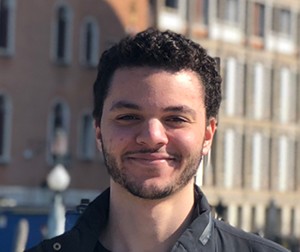
Ziad Ali, Stanford University
Ziad Ali is a 2nd-year PhD candidate and Knight-Hennessy Scholar in the Electrical Engineering program at Stanford University. He is from Oak Ridge, North Carolina and he earned his BS in Electrical Engineering and Biomedical Engineering from North Carolina State University, where he researched non-invasive ultrasound stimulation of neural tissue. His primary interest is in employing electrical engineering to solve problems in neuroscience. His dissertation research focuses on designing novel devices, for both clinical and experimental applications, to interface with neurons at the cellular level using magnetic fields. After graduating, Ziad plans to continue researching under-explored neural sensing and stimulating modalities with the goal of using them in closed-loop therapeutic brain implants to treat chronic neurological disorders. Outside of research, Ziad is committed to working on expanding STEM education opportunities for underprivileged students.
Essay What Happens Now?
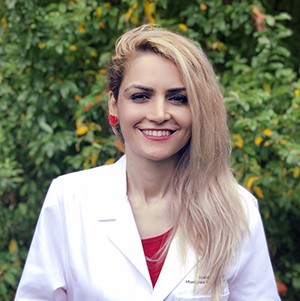
Banafsheh Nazari, Morehouse School of Medicine
As a child, Banafsheh developed her love for science from her father’s gift- Isaac Asimov’s science fiction novels. After completing her B.Sc. in microbiology and observing her mother’s struggles with an autoimmune disease, she continued her graduate studies in medical immunology at Tehran University of Medical Sciences. Later on, her desire to expand her knowledge led her to complete another graduate degree in biomedical sciences at Tufts University School of Medicine. Finally, she found her true calling in medicine, which she currently pursues at Morehouse School of Medicine. Her hope for helping those who suffer has constantly motivated her throughout this path that took her from her hometown in Iran to studying medicine in the U.S. No matter where she goes or what she does, she is a knowledge seeker at heart. Banafsheh enjoys poetry, Broadway musicals, and being outdoors.
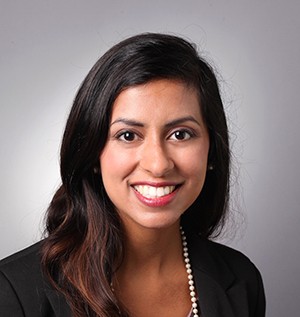
Trisha Pasricha, Massachusetts General Hospital
Trisha Pasricha, MD, is a 3rd year fellow in Gastroenterology at the Massachusetts General Hospital and physician-journalist. She is a graduate of Vanderbilt School of Medicine and Harvard College, where she earned a degree in Visual & Environmental Sciences and became interested in the power of media to raise awareness and promote change in medicine. She has directed two award-winning medical documentary films, and her writing has been featured in the Washington Post, CNN, and ABC News. After finishing her internal medicine residency in the Johns Hopkins Osler Medicine Training Program, she completed a clinical research fellowship in gastrointestinal motility disorders. She plans to pursue a career as a physician-scientist in neurogastroenterology. In her spare time, she is a resident tutor with her husband, Eshwan, at Harvard University and is raising a playful Chow Chow puppy.
Essay One more question
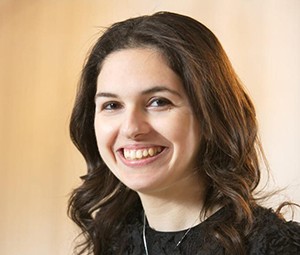
Miriam Saffern, Icahn School of Medicine at Mount Sinai
Miriam Saffern is a PhD candidate at the Icahn School of Medicine at Mount Sinai. Her passion for science writing began during her undergraduate years in the joint engineering program at Stern College for Women and Columbia University, where she studied biochemistry and biomedical engineering, wrote science articles for the student newspaper, and learned how to communicate her research to others. She is currently using both computational and experimental approaches to study immune surveillance and cancer risk in the lab of Dr. Robert Samstein. After graduate school, Miriam hopes to pursue a career that allows her to combine her interests in medical writing and computational immunology. Some of her hobbies include teaching herself coding, browsing bookstores, hand lettering, and experimenting with breakfast recipes.
Essay My Mother is a Layperson
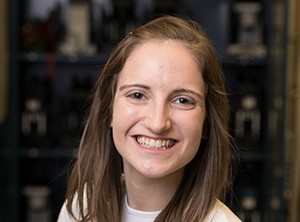
Adina Schonbrun, Memorial Sloan Kettering Cancer Center
Adina Schonbrun is a PhD candidate in the Gerstner Sloan Kettering Graduate School of Biomedical Sciences at Memorial Sloan Kettering Cancer Center. Born and raised in Maryland, Adina attended Yeshiva University for her undergraduate studies. While exploring life in New York City, she earned a BA in biology and gained valuable research experience in molecular genetics, microbiology, and cell biology laboratories along the way. Outside of science, Adina enjoys sports, music, and above all, spending time with her family.
Essay The Cornerstone of Scientific Success: Unsung Frontline Heroes of the COVID-19 Pandemic
